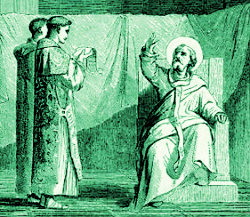Lives of the Saints
Our Models and Protectors
Spiritual Bouquet:
December 20

Saint Philogonius
Bishop of Antioch
(† 322)
Saint Philogonius, born in Antioch in the third century, was educated for the law and appeared at the bar with great success. He was admired for his eloquence, but still more for his integrity and the sanctity of his life. This was considered a sufficient motive for dispensing with the canons which require that time be spent as a priest, before a layman can be placed in the higher echelons of the Church's hierarchy. By this dispensation Saint Philogonius was chosen to be placed at the head of the see of Antioch, following the death of its bishop in 318.
When Arius introduced his blasphemies in Alexandria in that same year of 318, Saint Alexander, Patriarch of Alexandria, condemned him and communicated the sentence in a synodal letter to Philogonius. Afterwards the bishop of Antioch strenuously defended the Catholic faith before the assembly of the Council of Nicea. In the storms which raged against the Church, caused first by the Roman emperor Maximin II and the Oriental emperor Licinius, Saint Philogonius earned the title of Confessor by his sufferings. He died in the year 322, the fifth of his episcopal dignity. We possess an excellent panegyric in his honor, composed by Saint John Chrysostom.
Reflection: Saint Philogonius had so perfectly renounced the world and crucified its inordinate desires in his heart, that he received in this life the gage of Christ's Spirit, and was admitted to the sacred council of the heavenly King with unhindered access to the Almighty. Let us imitate his zeal for the glory of God and the Church, to share his reward. (Rev. Alban Butler)
Little Pictorial Lives of the Saints, a compilation based on Butler's Lives of the Saints and other sources, by John Gilmary Shea (Benziger Brothers: New York, 1894).